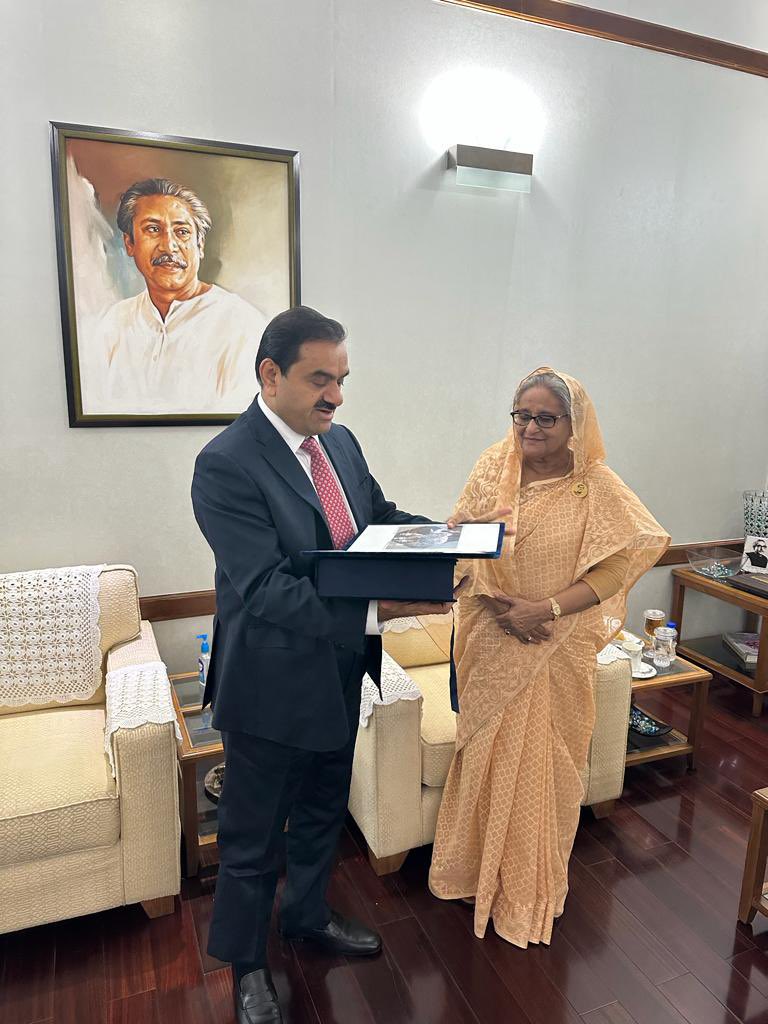KOLKATA
India’s first transnational power project that started three months ago is slowly, yet steadily, lowering costs of electricity in power-starved Bangladesh that has traditionally relied on power generated by liquid fuel.
This is a significant change; Adani group chairman Gautam Adani has explained to Bangladesh PM Sheikh Hasina. His visit follows commencement of power supply to Bangladesh from the group’s ultra-super critical thermal power plant (USCTPP) in Godda, Jharkhand.
The Godda power plant is the first in India to have started operations with 100 percent flue gas desulphurization (FGD), selective catalytic reconverter (SCR) and zero water discharge for minimizing emissions and for environment friendly operations.
The Godda USCTPP marks the Adani Group’s entry into transnational power projects. It is India’s first transnational power project where 100 per cent of the generated power is supplied to another nation. Adani’s visit is considered significant by Dhaka where critics had once argued that the cost of the power from the Godda power plant could turn expensive.
But such fears were allayed by the Adani group that said there would be no cost rise in electricity supplied from Godda. The price of electricity from the plant, which was built at an estimated cost of Rs 14,816 crore, would be $0.1363 per kilowatt-hour at the current coal rate in the international market, Adani Group said in a statement on April 2.
The prices of coal for Godda will be fixed on the average price of two indexes – the Indonesia HBA Index and the Australian Global Coal Newcastle Index – according to the power purchase agreement between Adani Group and PDB.
After the meeting, Gautam Adani tweeted: “Honoured to have met Bangladesh PM Sheikh Hasina on full load commencement and handover of the 1600 MW Ultra Super-Critical Godda Power Plant. I salute the dedicated teams from India and Bangladesh who braved COVID to commission the plant in a record time of three-and-a-half years.”
In fact, uninterrupted and reliable electricity at competitive tariff will eventually replace costly power generated in Bangladesh. Besides, the ultra-super-critical power plants will efficiently generate electricity with minimum impact on the environment, reports reaching here from Dhaka said.
The Godda plant, spread over 425 hectares of land in Jharkhand approximately 100 kms from the Bangladesh border, will supply 1,496 MW under the power purchase agreement signed with the Bangladesh Power Development Board. Commercial production at the plant started after a fortnight-long reliability test that ended in April, 2023. For the records, a reliability test is the continuous uninterrupted operation of the entire facility for 72 hours at maximum load. Interestingly, the reliability test was conducted in the presence of a technical committee of the Bangladesh Power Development Board (PDB).
Data sourced by the Power Grid Company of Bangladesh showed Adani’s Godda plant was supplying about 750 megawatts of electricity on average since April 1, 2023. The plant produced 685 MW of electricity in peak time during the day and 749 MW in the evening peak time. PDB is obliged to take 34 percent of the power generated by the plant every year over the 25-year contracted period. Earlier on March 9, 2023, the first unit of Adani’s Godda 1,600MW Thermal Power Plant was synchronised with the transmission line of the Power Grid Company of Bangladesh.
A fault in the transmission line, following Cyclone Mocha, disrupted supply on 7 June 2023. Bangladesh is importing 1,160MW of electricity from India’s eastern and western regions through two cross-border lines. According to the contract inked in 2017, Adani Power was supposed to supply 1,496 MW of electricity for 25 years from December 2021. Due to the pandemic the project completion was delayed and rescheduled for December 2022.

